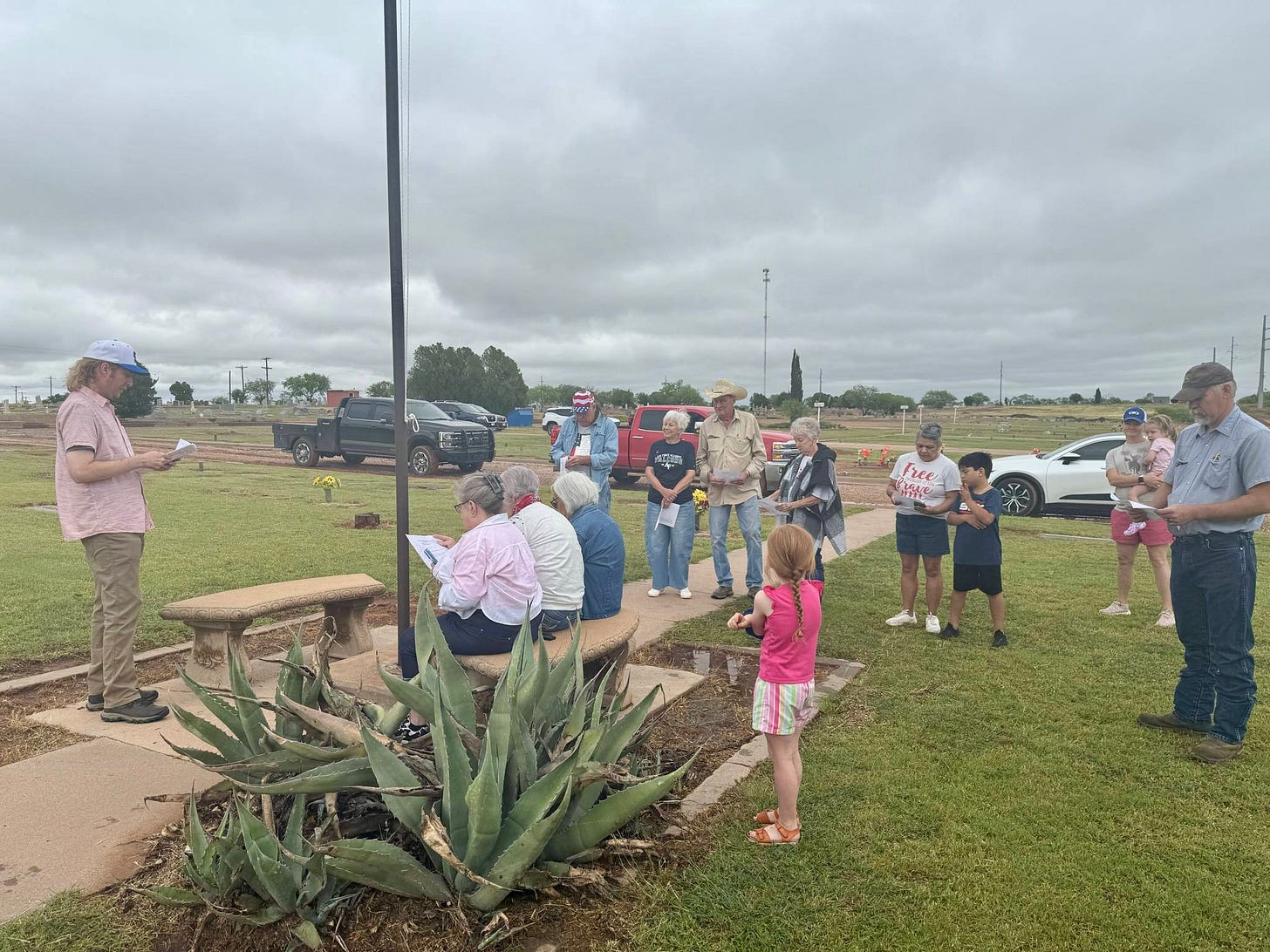Welcome to West of 98! If you are new here, read more about my Substack here. If you have not read my letter to new Secretary of Agriculture Brooke Rollins, I recommend it. Every month, I summarize my writing and a few good reads and recommendations here.
Words have meaning. As I get older, I think more about my word choice in particular circumstances, even when it’s something that I might have said all my life. I feel this way about the idea of “celebrating” Memorial Day. I’ll be honest, the word “celebrate” has a connotation better suited to July 4th, Christmas, and a few other holidays than it does for a day established to honor our war dead. This is not to say that we cannot have a good time on Memorial Day. We can. But ultimately, we should not forget the reason that the holiday exists, and if words matter, I prefer “honor” or “recognize” more than “celebrate.”
Last year, we embarked on a new Memorial Day tradition here in Stamford, honoring our local war dead with a Decoration Day ceremony. I wrote about that day and some of its origins and I have previously written about the early history of Memorial Day. There is no singular origin of the holiday, which coalesced from several antecedent observances. One important origin lies with the Grand Army of the Republic, a fraternal organization of Union veterans of the American Civil War. The organization’s leader John A. Logan issued a proclamation titled General Order No. 11 establishing a formal observance on May 30, 1868. This year, at Stamford’s second-annual Decoration Day ceremony, I read aloud that order as a prelude to reciting the roll call of 45 men from Stamford who gave their lives during World War I, World War II, Korea, and Vietnam.
Below, I have reprinted General Order No. 11 in its entirety. Logan speaks of the importance of keeping alive the memory of the sacrifice by those who gave their life in the name of freedom. He made this appeal only a few years after the American Civil War concluded, when those bloody memories were still fresh on the minds of many. I imagine that he was also speaking to future generations who would be required to work harder to preserve and honor those memories. I write this newsletter just over 160 years after General Lee surrendered to General Grant. Today, that war is five or more generations removed from the present day. Even our 20th century wars recede a little farther into the past every day. May we honor the sacrifice of those who lost their lives and keep their memories so long as the light and warmth of life remain to us.
General Orders No. 11
Headquarters, Grand Army of the Republic
Washington, DC, May 5, 1868I. The 30th day of May, 1868, is designated for the purpose of strewing with flowers, or otherwise decorating, the grave of comrades who died in defense of their country during the late rebellion, and whose bodies now lie in almost every city, village, hamlet, and churchyard in the land. In this observance, no form or ceremony is prescribed, but posts and comrades will, in their own way, arrange such fitting services and testimonials of respect as circumstances may permit.
We are organized, comrades, as our regulations tell us, for the purpose, among other things, “of preserving and strengthening those kind and fraternal feelings which have bound together the soldiers, sailors, and marines, who united to suppress the late rebellion.” What can aid more to assure this result than by cherishing tenderly the memory of our heroic dead, who made their breasts a barricade between our country and its foes? Their soldier lives were the reveille of freedom to a race in chains, and their deaths the tattoo of rebellious tyranny in arms. We should guard their graves with sacred vigilance. All that the consecrated wealth and taste of the nation can add, to their adornment and security, is but a fitting tribute to the memory of her slain defenders. Let no wanton foot tread rudely on such hallowed grounds. Let pleasant paths invite the coming and going of reverent visitors and fond mourners. Let no vandalism of avarice or neglect, no ravages of time, testify to the present or to the coming generations that we have forgotten, as a people, the cost of a free and undivided Republic.
If other eyes grow dull and other hands slack, and other hearts cold in the solemn trust, ours shall keep it well, as long as the light and warmth of life remain to us.
Let us, then, at the time appointed, gather around their sacred remains, and garland the passionless mounds above them with choicest flowers of springtime; let us raise above them the dear old flag they saved from dishonor; let us, in this solemn presence, renew our pledges to aid and assist those whom they have left among us, as sacred charges upon the nation’s gratitude,—the soldier’s and sailor’s widow and orphan.
II. It is the purpose of the Commander-in-Chief to inaugurate this observance, with the hope it will be kept up from year to year, while a survivor of the war remains to honor the memory of his departed comrades. He earnestly desires the public press to call attention to this order, and lend its friendly aid in bringing it to the notice of comrades in all parts of the country, in time for simultaneous compliance therewith.
III. Department commanders will use every effort to make this order effective.
By order of:
JOHN A. LOGAN
Commander-in-Chief.N.P. CHIPMAN
Adjutant-General.
James Decker is the Mayor of Stamford, Texas and the creator of the West of 98 website and the “Rural Church and State” and “West of 98” podcasts. Contact James and subscribe to these essays at westof98.substack.com and subscribe to him wherever podcasts are found. Check out the West of 98 Bookstore with book lists for essential reads here.




